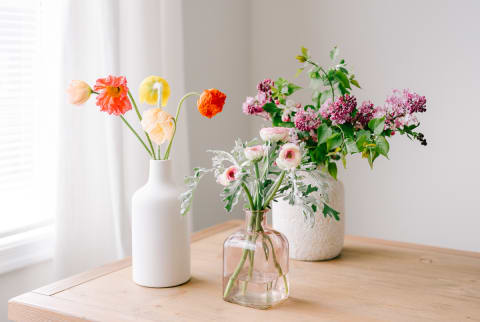Advertisement
Want To Keep Cut Flowers Alive For Longer? Here's A Science-Backed Trick


Even though we know that flowers bloom and fade in their own time, it's hard to be patient. Whenever we bring a fresh bouquet home, the hope is that it'll stay vivacious and vibrant for as many days as possible.
Thankfully, there are a few ways to play with the water in a cut flower vase to help blooms last longer, and adjusting surrounding air quality can also help stave off decay to a degree.
When it comes to clearing the air so your flowers can stay fresh, ethylene is the name to know. Ethylene is a gaseous hormone that flowers and fruits accumulate and emit as they age. Caren Chang, Ph.D., a professor at the University of Maryland who researches the gas, says that, on the plus side, it helps promote fruit ripening. (It's why you can stick a green tomato into a paper bag with a nearly gone banana. The banana will emit ethylene gas that helps the tomato ripen.)
The downside, Chang explains, is that ethylene can also cause leaves to drop and flower petals to die off. Injured flowers—like those that have just been collected for a bouquet—will give off a lot of ethylene as a last resort, hence why cut flowers tend to lose their vigor relatively quickly. As such, to keep them in good shape for longer, you'll want to minimize their exposure to any excess ethylene gas. Here are two easy ways to do so:
Place them away from fruit bowls
Some plant species emit more ethylene than others. "Tomatoes, apples, bananas, pears, and many other fruits emit a high level of ethylene because, in most plants, the ethylene hormone is an essential hormone for fruit ripening," Chang tells mindbodygreen.
Once in the air, the ethylene that these fruits emit can travel a long way. In the process, it tends to disperse and lose some of its potency. Chang notes that by the time it reaches any nearby flowers, the ethylene from fruits will likely have diffused enough to not be an issue. However, floral stylist Harriet Parry previously told mbg that she's noticed flowers do tend to fade faster when placed next to fruits.
To play it safe, you may want to keep your cut flowers away from your open fruit bowls to prevent premature decay.
Place them away from grills or fire pits
Natural gas and petroleum are also major sources of ethylene (a natural byproduct of combustion), meaning they can be harmful to plant life.
For evidence of this, Chang points to one study conducted on the busy Beltway highway1 in Washington, D.C., that found that the high ethylene levels from car exhaust caused nearby plants to grow stunted. "When the ethylene was chemically removed from the Beltway environment, the plants looked much better," she says. And back in the 1800s, when street lamps were lit with gas, the trees surrounding the street lamps tended to drop their leaves.
For this reason, Chang recommends placing all your plants—cut or not—away from any gas source (car exhaust, fire pits, barbecue grills, oil lanterns, etc.) to keep them growing vigorously.
The takeaway
There are many ways to get a few more colorful days out of your cut flowers.
Besides the basic care tips like cutting their stems at an angle, cleaning out their water, and keeping them away from direct sun, placing them out of ethylene hot spots may help them bloom brighter and longer.